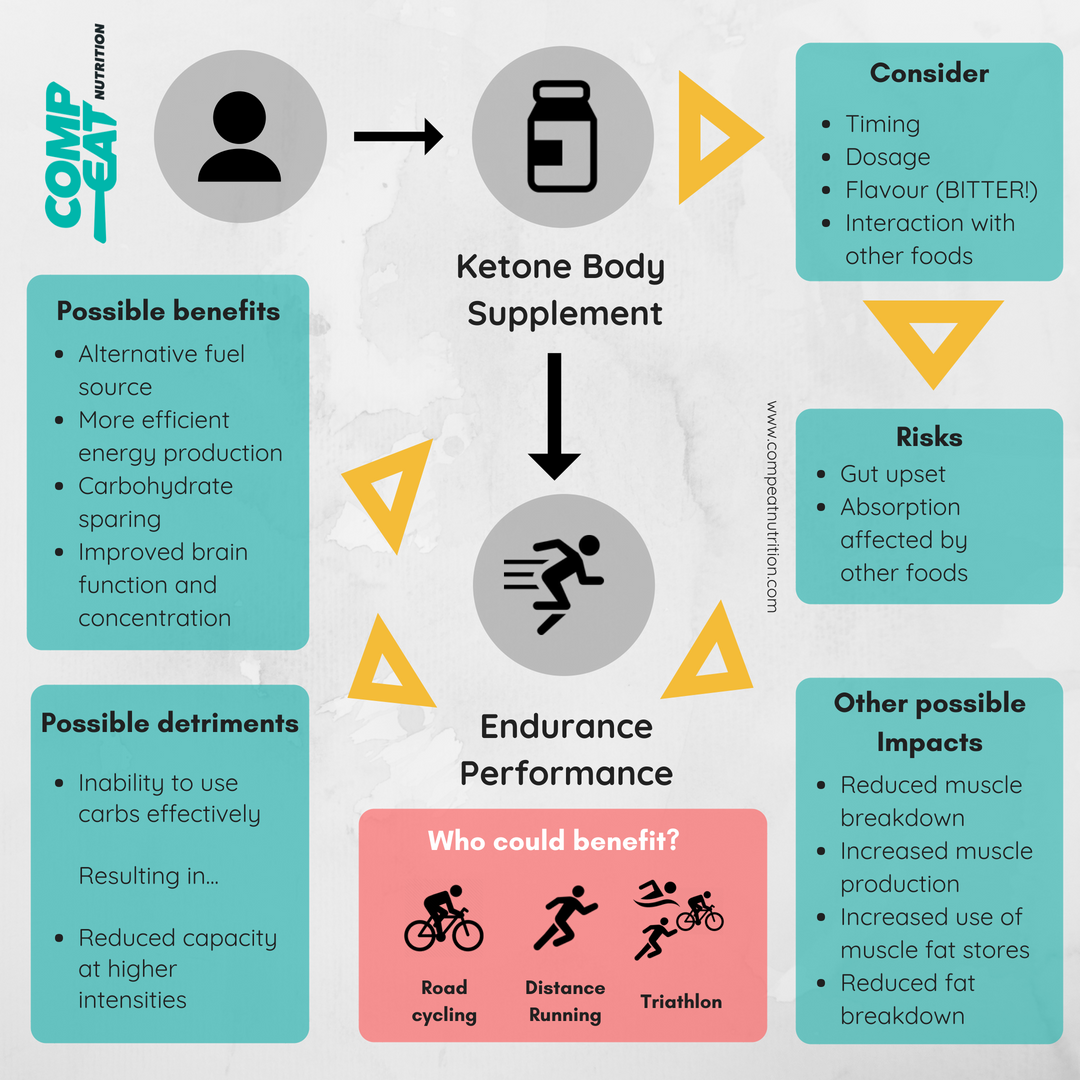Ketone bodies - The Newest Supplement for Endurance Performance?
By now you have likely heard of the keto (or HFLC) diet type being adopted by many in both the general and athletic population (sometimes falsely). However, as recent research attests, adaptation to a ketogenic diet can result in reduced exercise economy. What we mean by that is that you can actually be less efficient following a low carbohydrate diet, which is contrary to current popular belief.
To understand how ketone supplementation works, we must first explore what happens to the body when someone follows a low carb or keto diet.
In the absence of carbohydrates from the diet, the body is forced to produce its own fuel. These are known as ketones and are produced in the liver by breaking down fatty acids. Ketone bodies are essential because they are the only other type of fuel that will be used by the brain.
This is where the theory behind the possible value of exogenous (external) supplementation of ketone bodies (via ketone salts and esters) comes in. Is it possible to increase the levels of ketones without the strict adherence to a HFLC diet and the associated performance detriments?
How are ketone esters used?
Ketone esters (NOTE: Esters are different to the Ketone Salts that are much more readily available!) are split in the gut and taken into the blood, reaching peak concentrations in 1-2 hours.
Whether these ketones are used or not will then depend on which tissue it’s in (brain vs. muscle) and the athlete’s training status. Endurance based athletes are suggested to have a greater capacity to oxidise ketone bodies – so the higher trained athletes may be better prepped for ketone utilisation.
Also, if an athlete already has high levels of circulating ketones (e.g. if following a ketogenic diet), their muscles will be close to saturated and absorption will be reduced significantly.
How could supplementing ketones benefit performance?
Ketone supplementation may provide a more practical way for athletes to induce ketosis for a positive effect on performance. This may be due to:
- Their use as an alternative fuel source
- Decreases in fatigue
- Improved mental function.
Unfortunately, data from performance studies are currently extremely limited.
In terms of endurance performance, ketone bodies can be used as a fuel source for skeletal muscle. Theoretically, this means that muscle carbohydrate stores are spared for higher intensity efforts (more on this topic here).
However, this could also go the other way: by preventing the use of carbohydrates at lower intensities, you may also impede carbohydrate use at higher intensities – therefore lowering your performance capacity.
This leads to ketone supplementation likely being irrelevant in the vast majority of sporting endeavours that require high-intensity efforts or are of shorter duration. However, in sports such as triathlon, road cycling or endurance running, carbohydrate availability can be a limiting factor to performance, and therefore glycogen sparing may be of possible performance benefit.
Other Things to Consider
- COST! The real deal – Ketone Esters – have only just hit the market, and per dose are EXPENSIVE! This will really limit when you can use it and even if you can afford to trial it’s use in training.
- Be wary of Ketone Salts. These are sold most often by Multi-Level Marketing companies and have been shown not to get the blood ketone levels high enough to induce a performance benefit. There are some benefits still, but you may not need to follow a keto diet to get them – which is what the main company selling them claims!
- Be cautious of imposters – there are plenty of products out there claiming to be ketone inducing that are clearly not once looking through the ingredients!
- Seek advice regarding timing and dosage for important endurance events. Even longer events require intermittent stages of increased effort (e.g. hill efforts or sprints). This should be considered prior to supplementation.
- It is important to consider your own individual tolerance of ketone bodies both close to an event and during an event. Issues can include gut tolerance, the poor tolerance of the bitter taste and the larger amounts of fluid that need to be consumed with the ester.
- Absorption of ketones are affected by other nutrients – if taken incorrectly, this could compromise how you fuel for your event. Seek professional advice when if unsure.
Summarising the Evidence:


ALICIA EDGE HEAD SPORTS DIETITIAN
Alicia is the head Advanced Sports Dietitian at Compeat Nutrition. She is also a mum and triathlete, so advice extends beyond the basics and is instead focused on providing effective and achievable nutrition for both training and racing.